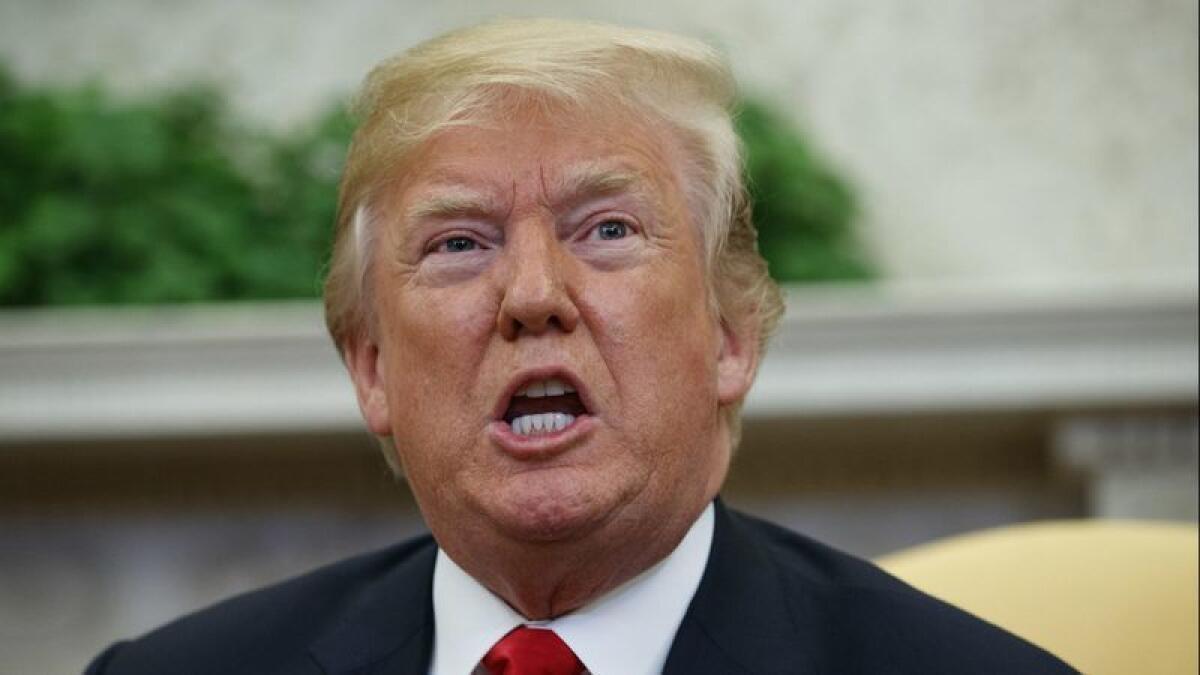Trump is creating the worst constitutional crisis in 150 years

- Share via
The Trump administration has now set the stage for a constitutional crisis, one that the United States hasn’t seen in this form since the battles between Andrew Johnson and the Reconstruction Congress more than 150 years ago.
Johnson, like President Trump, also thought that Congress was engaging in unconstitutional and illegitimate presidential harassment. As tensions ratcheted up, the branches of government in 1868 grew increasingly fearful of one another. Conspiracy theories ran rampant, and the prospect of violence seemed to be just around the corner. Presidential impeachment, and the refusal of either political party to nominate Johnson for another term in the White House, finally brought the battle to a close.
Since the 2018 midterm election, the Trump White House has been increasingly bold in declaring its authority to stonewall, impede and ignore congressional investigations. The recent letter from White House Counsel Pat Cipollone to House Speaker Nancy Pelosi goes even further.
It labels the House impeachment effort “constitutionally invalid” and “illegitimate,” attempts to dictate the terms of the impeachment process to the House and announces the administration’s refusal to cooperate in any way with the congressional committees seeking to review its actions.
As a political document, the letter sets an ominous tone, putting congressional oversight and the impeachment process at the mercy of the White House. Future administrations would no longer need to bother offering arguments to cover particular pieces of information with executive privilege. They could simply announce a policy of general non-cooperation with hostile congressional committees.
The White House’s claim that the congressional investigation is an attempt to “overturn” an election through an “invalid” and “illegitimate” process may signal the even more alarming possibility that the president might declare the results of an impeachment trial equally illegitimate and invalid and refuse to accept the authority of Congress to remove him from office.
Pundits and politicians have in recent years have been quick to declare a constitutional crisis for political purposes. Trump himself has played this card, telling voters in the final days of the 2016 presidential campaign that a Hillary Clinton presidency would be immediately consumed by a constitutional crisis as the president faced criminal investigation and possible impeachment. The only way America could avoid that fate, he said, was to vote for him.
In fact, the phrase has no meaning as a legal term within American constitutional law. Disagreements between the branches of government and differing interpretations of the Constitution are all routine features of ordinary political life in a constitutional republic. And we have more than 200 years of experience dealing with such conflicts.
Real constitutional crises involve situations in which the constitutional system itself breaks down. Such episodes have been exceedingly rare in American history, but they have sometimes happened.
When the Federalists who gathered in Philadelphia in 1787 decided to ignore the constitutional rules about how to amend the Articles of Confederation and Congress and the state legislatures went along with them — that was a constitutional crisis, one that led to the creation of an entirely new constitutional system. When the slaveholding states of the South proclaimed that they were seceding from the United States, that was a constitutional crisis, one that had to be resolved through a war.
Still, even using the rhetoric of constitutional crisis to justify political actions can be dangerous. Cipollone’s letter, for instance, sets up a claim that Congress has precipitated a constitutional crisis and that the president should respond for the good of the nation by defying Congress and refusing to cooperate.
Despite what Trump and Cipollone argue, Congress following the constitutional rules to impeach a president for alleged high crimes and misdemeanors is not a constitutional crisis. The framers provided that mechanism expecting that its use would be unusual but sometimes necessary.
If the House misuses its impeachment power, then that argument can be made to senators in an impeachment trial and to voters at the next congressional election. Asserting a contested claim of executive privilege might be mistaken, but such disputes can be resolved within the political and judicial process.
However, simply declaring that congressional investigations are illegitimate and are to be ignored threatens to destabilize and dramatically alter the constitutional system itself. Impeachment is the means for addressing such a frontal challenge to congressional authority. Congress can reassert and vindicate its own powers by holding the president to account.
Republicans in Congress would do well to emphasize to the president that it is not for him to decide whether an impeachment is invalid and whether congressional investigations are worthy of cooperation.
If Trump has a case to make that he should not be impeached and removed from office, then he should make that case and try to persuade Republican senators to stick by him. Attempting to tear down Congress as an institution, subvert its legitimacy, and undermine its ability to conduct even routine oversight activities will do long-term damage to the American separation of powers. And it will make it all the more difficult to check other presidents in the future and embolden them to build on Trump’s example.
Andrew Johnson only ceased his opposition to Congress when it became clear that was the only way to save his presidency and serve out the remainder of his term in office. Trump might need to be convinced of the same.
Keith E. Whittington is a professor of politics at Princeton University and the author of the forthcoming “Constitutional Crises, Real and Imagined.”
More to Read
A cure for the common opinion
Get thought-provoking perspectives with our weekly newsletter.
You may occasionally receive promotional content from the Los Angeles Times.









